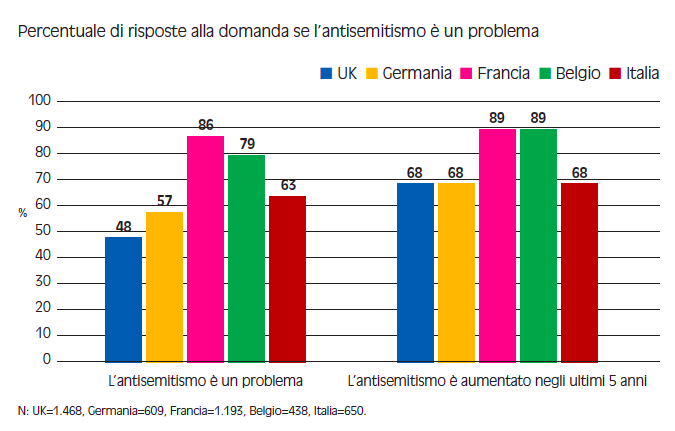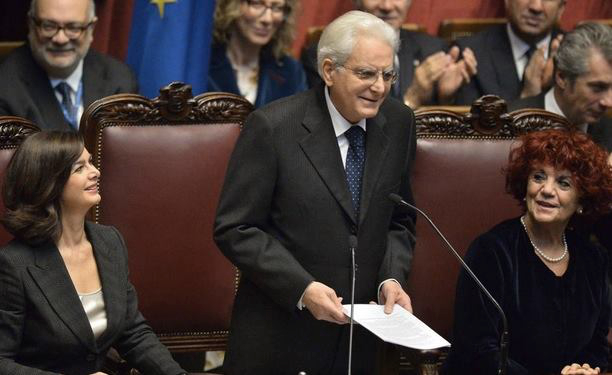
 |
| Italian Word of the Week ARCHIVIO |
| by Daniela
Gross The Italian word “archivio” derives from Greek and Latin - “archium” or “archivium”. Except for the pronunciation, which is completely different (in Italian it sounds “ar-kee-vee-o), the word of the week is so similar to the English word “archive” that there is no need for translation. The role of the archives, to preserve the evidence of the past, has often been highlighted in Italian and in English, and it is crucial when we talk about the Shoah. Without documents – whether they are letters, photographs, objects, or oral testimony – we run the risk of losing an immense piece our own history, and of squandering the efforts of the survivors that testify about their persecution. To avoid this issue, the Cdec-Foundation Jewish Contemporary Documentation Center based in Milan, recently set up an important new service. The entire catalog of its library, along with the archival resources on the history of the Shoah in Italy, are now available online (http://digital-library.cdec.it). The website, which will be further improved in the near future, allows visitors to access interviews and testimonies about the Shoah, produced or collected by Cdec from the 1980’s. You can also browse the list of the Italian victims and all their data (date of birth and death, places of arrest and detention). It is also possible to access photographs from various archival collections. The website boasts an unpublished collection of photographs of the childhood of Anna Maria and Primo Levi. This project is supported by the Ministry of Culture. |






This newsletter is published under difficult conditions. The editors of this newsletter are Italian journalists whose native language is Italian. They are willing to offer their energy and their skills to give international readers the opportunity of learning more about the Italian Jewish world, its values, its culture and its traditions.
In spite of all our efforts to avoid this, readers may find an occasional language mistake. We count on your understanding and on your help and advice to correct these mistakes and improve our publication.
Pagine Ebraiche International Edition is published by the Union of Italian Jewish Communities (UCEI). UCEI publications encourage an understanding of the Jewish world and the debate within it. The articles and opinions published by Pagine Ebraiche International Edition, unless expressly stated otherwise, cannot be interpreted as the official position of UCEI, but only as the self-expression of the people who sign them, offering their comments to UCEI publications. Readers who are interested in making their own contribution should email us at desk@ucei.it
You received this newsletter because you authorized UCEI to contact you. If you would like to remove your email address from our list, or if you would like to subscribe using a new email address, please send a blank email to desk@ucei.it stating "unsubscribe" or "subscribe" in the subject field.
© UCEI - All rights reserved - The articles may only be reproduced after obtaining the written permission of the editor-in-chief. Pagine Ebraiche - Reg Rome Court 199/2009 – Editor in Chief: Guido Vitale - Managing Editor: Daniela Gross.
Special thanks to: Francesco Moises Bassano, Susanna Barki, Amanda Benjamin, Monica Bizzio, Angelica Edna Calò Livne, Eliezer Di Martino, Alain Elkann, Dori Fleekop, Daniela Fubini, Benedetta Guetta, Sarah Kaminski, Daniel Leisawitz, Annette Leckart, Gadi Luzzatto Voghera, Yaakov Mascetti, Francesca Matalon, Jonathan Misrachi, Anna Momigliano, Giovanni Montenero, Elèna Mortara, Sabina Muccigrosso, Lisa Palmieri Billig, Jazmine Pignatello, Shirley Piperno, Giandomenico Pozzi, Daniel Reichel, Colby Robbins, Danielle Rockman, Lindsay Shedlin, Rachel Silvera, Adam Smulevich, Simone Somekh, Rossella Tercatin, Ada Treves, Lauren Waldman.
Questo notiziario è realizzato in condizioni di particolare difficoltà. I redattori di questo notiziario sono giornalisti italiani di madrelingua italiana. Mettono a disposizione le loro energie e le loro competenze per raccontare in lingua inglese l'ebraismo italiano, i suoi valori, la sua cultura e i suoi valori. Nonostante il nostro impegno il lettore potrebbe trovare errori e imperfezioni nell'utilizzo del linguaggio che faremo del nostro meglio per evitare. Contiamo sulla vostra comprensione e soprattutto sul vostro aiuto e sul vostro consiglio per correggere gli errori e migliorare.
Pagine Ebraiche International Edition è una pubblicazione edita dall'Unione delle Comunità Ebraiche Italiane. L'UCEI sviluppa mezzi di comunicazione che incoraggiano la conoscenza e il confronto delle realtà ebraiche. Gli articoli e i commenti pubblicati, a meno che non sia espressamente indicato il contrario, non possono essere intesi come una presa di posizione ufficiale, ma solo come la autonoma espressione delle persone che li firmano e che si sono rese gratuitamente disponibili. Gli utenti che fossero interessati a offrire un proprio contributo possono rivolgersi all'indirizzo desk@ucei.it
Avete ricevuto questo messaggio perché avete trasmesso a Ucei l'autorizzazione a comunicare con voi. Se non desiderate ricevere ulteriori comunicazioni o se volete comunicare un nuovo indirizzo email, scrivete a: desk@ucei.it indicando nell'oggetto del messaggio "cancella" o "modifica".
© UCEI - Tutti i diritti riservati - I testi possono essere riprodotti solo dopo aver ottenuto l'autorizzazione scritta della Direzione. Pagine Ebraiche International Edition - notiziario dell'ebraismo italiano - Reg. Tribunale di Roma 199/2009 - direttore responsabile: Guido Vitale - Coordinamento: Daniela Gross.
Realizzato con il contributo di: Francesco Moises Bassano, Susanna Barki, Amanda Benjamin, Monica Bizzio, Angelica Edna Calò Livne, Eliezer Di Martino, Alain Elkann, Dori Fleekop, Daniela Fubini, Benedetta Guetta, Sarah Kaminski, Daniel Leisawitz, Annette Leckart, Gadi Luzzatto Voghera, Yaakov Mascetti, Francesca Matalon, Jonathan Misrachi, Anna Momigliano, Giovanni Montenero, Elèna Mortara, Sabina Muccigrosso, Lisa Palmieri Billig, Jazmine Pignatello, Shirley Piperno, Giandomenico Pozzi, Daniel Reichel, Colby Robbins, Danielle Rockman, Lindsay Shedlin, Rachel Silvera, Adam Smulevich, Simone Somekh, Rossella Tercatin, Ada Treves, Lauren Waldman.







